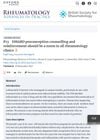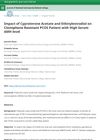 4 citations,
June 2017 in “Endocrine Reviews”
4 citations,
June 2017 in “Endocrine Reviews” Dihydrotestosterone (DHT) mainly affects nearby cells, doesn't significantly change prostate hormonal environment or cancer risk, and doesn't play a main role in causing hair loss or acne. More research is needed on its effects on heart health, sexual function, and bone health.
 2 citations,
July 2012 in “Journal of Pediatric and Adolescent Gynecology”
2 citations,
July 2012 in “Journal of Pediatric and Adolescent Gynecology” A 12-year-old girl with very high testosterone and insulin resistance improved with birth control pills, suggesting PCOS can cause high testosterone without tumors.
2 citations,
July 2012 in “Obstetrics, gynaecology and reproductive medicine” Hirsutism in women often indicates health issues like polycystic ovarian syndrome and is treated with lifestyle changes, medication, and cosmetic measures.
 1 citations,
August 2013 in “Springer eBooks”
1 citations,
August 2013 in “Springer eBooks” Birth control pills and anti-androgen medications help manage hair growth, acne, and hair loss in women with PCOS.
 1 citations,
October 2010 in “Cambridge University Press eBooks”
1 citations,
October 2010 in “Cambridge University Press eBooks” Hormonal therapies are effective for managing hair and skin symptoms in women with PCOS.
1 citations,
July 2006 in “Reviews in gynaecological and perinatal practice” The document concludes that hirsutism in women, often caused by PCOS, requires systematic evaluation and can be treated with medications, mechanical removal, or cosmetic methods, with weight loss also being beneficial.
 January 2025 in “Dermatology and Therapy”
January 2025 in “Dermatology and Therapy” Hormonal therapies effectively treat acne and improve quality of life.
 April 2023 in “Expert opinion on pharmacotherapy”
April 2023 in “Expert opinion on pharmacotherapy” Birth control pills and antiandrogens are the most effective medicines for excessive body hair in women, but combining them with other treatments and psychological support is best.
 December 2022 in “OBG Management”
December 2022 in “OBG Management” The conclusion is to diagnose PCOS with just hyperandrogenism and irregular periods, and treat with lifestyle changes and basic medications.
 September 2022 in “Women's healthcare”
September 2022 in “Women's healthcare” PCOS is managed by lifestyle changes and personalized medication to improve symptoms and fertility.
May 2021 in “Journal of the Endocrine Society” Adolescents with PCOS have higher levels of certain androgens, which are linked to hair growth but don't help diagnose PCOS better than testosterone levels.
 November 2020 in “Elsevier eBooks”
November 2020 in “Elsevier eBooks” Antiandrogens and androgen inhibitors like spironolactone, finasteride, and dutasteride can treat hair loss and skin conditions, but they have risks and side effects, including potential harm to pregnant women and risks of cancer and heart issues. Herbal remedies also have antiandrogenic effects but lack safety validation.
 May 2019 in “Paediatrics and child health”
May 2019 in “Paediatrics and child health” The document concludes that personalized treatment, including lifestyle changes and medication, is essential for managing PCOS in teenagers, while also addressing their psychological well-being.

PCOS is a common hormonal disorder with symptoms like irregular periods and excess hair growth, managed with lifestyle changes and medications.
June 2015 in “Obstetrics, gynaecology and reproductive medicine” Hirsutism, excessive hair growth in women, is often caused by polycystic ovarian syndrome and is treated by targeting the cause, lifestyle changes, and medication.
 September 2011 in “American Journal of Clinical Dermatology”
September 2011 in “American Journal of Clinical Dermatology” The birth control pill containing ethinylestradiol and chlormadinone may help treat acne and other skin and hair conditions related to hormones.
 March 2007 in “Journal of Obstetrics and Gynaecology Canada”
March 2007 in “Journal of Obstetrics and Gynaecology Canada” Birth control pills slightly increase the risk of breast cancer, especially if used before the first full-term pregnancy.

Polycystic ovary syndrome (PCOS) affects about 10% of women, is often linked to obesity and family history, and can cause irregular periods, fertility issues, and other symptoms. It's usually managed with lifestyle changes, weight loss, and medication.
 April 2021 in “Interciencia médica”
April 2021 in “Interciencia médica” PCOS is a common condition in women that causes various symptoms and health issues, treatable with lifestyle changes and medication.
January 2021 in “Voprosy ginekologii akušerstva i perinatologii” Effective management of hyperandrogenism in young women requires accurate diagnosis and tailored treatment.
 June 2016 in “The Egyptian Journal of Fertility and Sterility”
June 2016 in “The Egyptian Journal of Fertility and Sterility” The study concluded that personalized treatment, including medical and cosmetic approaches, is effective for women with PCOS and hirsutism.
1 citations,
January 1999 in “The European journal of contraception & reproductive health care” Valette® is an effective birth control pill that also reduces greasy hair and skin.
 March 2024 in “BMC women's health”
March 2024 in “BMC women's health” The levonorgestrel implant increases free testosterone and lowers SHBG more than DMPA-IM and the copper IUD.
 November 2024 in “Rheumatology Advances in Practice”
November 2024 in “Rheumatology Advances in Practice” Rheumatology clinics should always provide preconception counseling for women on DMARDs.
7 citations,
July 2004 in “Endocrine practice” Acromegaly can be hard to diagnose in young women with atypical symptoms, and persistent high phosphate levels should lead to growth hormone testing.
 January 2021 in “Journal of Shaheed Suhrawardy Medical College”
January 2021 in “Journal of Shaheed Suhrawardy Medical College” Cyproterone acetate and ethinylestradiol significantly lowered AMH levels in PCOS patients resistant to clomiphene.
514 citations,
February 2011 in “International journal of women's health” Different treatments for PCOS focus on the specific symptoms, with weight loss and lifestyle changes being important.
 33 citations,
January 2009 in “Contraception”
33 citations,
January 2009 in “Contraception” Chlormadinone acetate is a strong, well-tolerated hormone used in birth control and hormone therapy with benefits for menstrual pain and skin conditions.
 5 citations,
January 1987 in “Gynecologic and obstetric investigation”
5 citations,
January 1987 in “Gynecologic and obstetric investigation” Cyproterone acetate implants were more effective at reducing facial hair and improving skin in severe hirsutism than oral treatment.
 1 citations,
June 2022 in “JAAD case reports”
1 citations,
June 2022 in “JAAD case reports” A woman developed a severe skin reaction after getting a birth control implant.





















